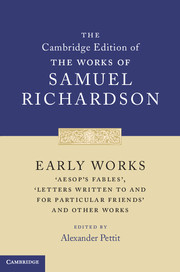Book contents
- Frontmatter
- Dedication
- Contents
- General Editors’ Preface
- Acknowledgements
- Chronology
- List of Abbreviations
- General Introduction
- Textual Introduction
- The Apprentice’s Vade Mecum (1733)
- A Seasonable Examination of the Pleas and Pretensions (1735)
- Preface to Aubin, A Collection of Entertaining Histories and Novels (1739)
- Aesop’s Fables (1739)
- Letters Written to and for Particular Friends (1741)
- Six Original Letters Upon Duelling (1765)
- Appendix: The Infidel Convicted (1731)
- Postscript
- Emendations
- Word-division
- Bibliographical Descriptions of Early Editions
- Explanatory Notes
- Index
Letter CLXV
Published online by Cambridge University Press: 30 June 2022
- Frontmatter
- Dedication
- Contents
- General Editors’ Preface
- Acknowledgements
- Chronology
- List of Abbreviations
- General Introduction
- Textual Introduction
- The Apprentice’s Vade Mecum (1733)
- A Seasonable Examination of the Pleas and Pretensions (1735)
- Preface to Aubin, A Collection of Entertaining Histories and Novels (1739)
- Aesop’s Fables (1739)
- Letters Written to and for Particular Friends (1741)
- Six Original Letters Upon Duelling (1765)
- Appendix: The Infidel Convicted (1731)
- Postscript
- Emendations
- Word-division
- Bibliographical Descriptions of Early Editions
- Explanatory Notes
- Index
Summary
From the Aunt, containing solid
Advice and Caution on this Occasion.
Dear Lydia,
Your last Letter pleased me much better than your two former: For your first held me in great Suspense; your second gave me Concern for your rigorous Treatment of poor Mr. Rushford, who, ‘tis plain, loves you much; but your third confirms me in the Opinion I always entertain’d of your Prudence, in preferring a Man of Sense to a Coxcomb.
I must tell you, that nothing could give me greater Pleasure, than to see you Mr. Rushford 's Bride. His Fortune is good, his Person manly and agreeable, and his Behaviour polite. But in my Opinion, you have need of all your Prudence and Caution, to avoid giving him a lasting Disgust; for I would have you always remember, my Dear, that nothing can give such Dislike to a Man of Wisdom and Discernment, as to make him imagine a Fool is preferr’d to him.
If Mr. Rushford did not love you, he would not be jealous of such a Fop as you describe; and it is enough to keep his Passions awake, when he sees you so grave and so severe, as I may say, to him, and so facetious and chearful with the other. For many a Woman of Sense, in other respects, has been caught by some of those ridiculous Airs that such empty Laughers give themselves; and if you should carry your Jest too far, it might make him despise a Levity, as he would be apt to construe it, which he would think unworthy of his Addresses.
I know it is but too natural to our Sex to love to be admired; but this Humour, when not properly bounded and guarded, has many times cost us dear, even the Happiness of all our Lives. Don't be afraid of obliging Mr. Rushford, in a Point so material to his Tranquillity, and your own Reputation, as the forbidding the Visits of your Man of Scarlet: For, as you intend not to encourage him, and he has so undaunted an Assurance, founded on so much Folly, I think, if you had no other humble Servant, it would not be reputable to receive this; much less when you have one of so different a Cast, that Light and Darkness are not more opposite:
- Type
- Chapter
- Information
- Early Works'Aesop's Fables', 'Letters Written to and for Particular Friends' and Other Works, pp. 511 - 513Publisher: Cambridge University PressPrint publication year: 2011

